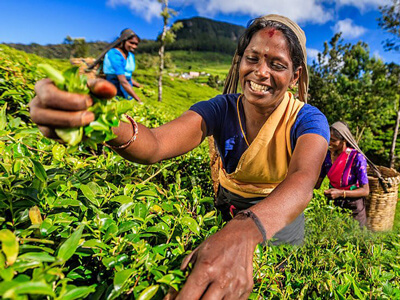Every Sip Echoes a Commitment to Environmental Harmony and Social Well-being
At Agarapatana Plantation, sustainability is ingrained in our operational philosophy, where each estate functions as a Strategic Business Unit (SBU), responsible for managing its own financial dynamics. This unique approach compels each SBU to enhance production, aligning with projected outflows, thereby bolstering our overall profitability. We prioritize effective labor utilization, ensuring a harmonious balance between productivity and the well-being of our workforce. Embracing technological advancements, we have introduced a robust Management Information System, fostering efficiency and informed decision-making across our plantations. Furthermore, our commitment to sustainability extends to strategic investments in mechanization, embracing innovative solutions that not only streamline processes but also minimize our environmental footprint. At Agarapatana, we believe in a holistic approach to sustainability, intertwining economic viability with environmental stewardship and social responsibility.

Sustainability at the Heart of our Roots
It's wonderful to see the commitment of Agarapatana Plantations PLC to sustainability. The principles outlined in "Nurturing the Future ,Sustaining the Present" demonstrate a comprehensive approach to environmental responsibility and community engagement. Let's take a closer look at each element:
Environmental Stewardship:
This reflects a commitment to taking care of the environment and minimizing the impact of plantation activities on ecosystems. It may involve practices like soil conservation, water management, and biodiversity preservation.
Responsible Resource Management:
Efficient and responsible use of resources, including water, soil, and energy, is critical for sustainable agriculture. Implementing practices that optimize resource utilization can contribute to long-term viability.
Eco-Friendly Pest and Disease Management:
The emphasis on eco-friendly solutions is commendable, as it promotes the use of methods that minimize harm to the environment and biodiversity. Integrated pest management and organic farming practices could be examples.
Conservation and Reforestation:
Reforestation is crucial for maintaining ecological balance and combating deforestation. It's encouraging to see a commitment to conservation, which can include reforesting degraded areas and protecting existing natural habitats.
Community Engagement:
Involving and benefiting local communities is essential for sustainable development. This could involve providing employment opportunities, supporting local education, and collaborating with nearby communities on environmental and social initiatives.
Certifications and Compliance:
Seeking and maintaining certifications demonstrates a commitment to meeting specific environmental and ethical standards. This can enhance the credibility of the plantation and assure stakeholders that it adheres to recognized sustainability benchmarks.
Transparency and Accountability:
Openly communicating about sustainability practices and performance fosters trust with stakeholders. Being transparent about challenges, successes, and goals encourages accountability and allows for continuous improvement.
By integrating these principles into daily operations, Agarapatana Plantations PLC is contributing to the broader movement towards sustainable and responsible agriculture. This not only benefits the environment but also ensures the longevity of the plantation and the well-being of the surrounding communities. Communicating these commitments to consumers and stakeholders can further enhance the positive impact and inspire others to follow suit in sustainable practices.
Certification
We take great pride in the recognition and certifications we have obtained, which underscore our dedication to product responsibility, food safety, and sustainable practices. By implementing and upholding the Food Safety Management System (ISO 22000:2018 & HACCP 9001:2015) across all our tea processing centers, we ensure that every step of our tea production, from planting to harvesting, processing, and distribution, adheres to stringent food safety and quality standards. This commitment guarantees that our customers receive a product that meets the highest levels of safety and excellence. Furthermore, our Rainforest Alliance farm certification is a testament to our ongoing journey towards sustainability. This certification covers all our tea gardens and serves as tangible proof of our efforts to operate in an environmentally conscious and socially responsible manner. It showcases our commitment to protecting the environment, preserving biodiversity, and prioritizing the health and safety of our workers.

Rainforest Alliance Sustainable Agricultural Standard 2020:
The Rainforest Alliance Standard is a comprehensive framework consisting of six chapters, each addressing vital aspects of sustainable agriculture. With a total of 112 core requirements and an additional nine mandatory requirements, our Up Country region has diligently met and exceeded all 121 standards. These include Management, Traceability, Income & Shared Responsibility, Farming, Social, and Environment, ensuring that our practices are not only environmentally friendly but also socially and economically responsible.

ISO 22000:2018 and 9001:2015 Certification:
In addition to Rainforest Alliance certification, out of eleven Tea Estates in Agras region nine Estates Tea processing centers are ISO 22000;2018 certified and additionally another four Tea processing centers are ISO 9001;2015 certified, In Uva region Out of eight Tea processing centers all are ISO 22000:2018 and three processing centers are 9001:2015 certified. ISO 22000:2018 focuses on food safety management, encompassing 92 criteria, while ISO 9001:2015, emphasizing quality management, consists of 116 criteria. Compliance with these standards ensures that our products meet the highest global standards for quality and safety.
Driven by these certifications and guided by our commitment to producing a superior product, we unwaveringly uphold the highest standards of agricultural practices. This not only ensures the quality of our tea but also contributes to the protection of the environment and the promotion of worker health and safety. By adhering to sustainable agricultural standards throughout our plantations, we strive to leave a positive impact on the communities and ecosystems where we operate in.
APL – AGRAS REGION CERTIFICATION AND COMPLIANCE
| APL – AGRAS REGION | |||
|---|---|---|---|
| ESTATE | RAINFOREST ALLIANCE | ISO 22000:2018 | ISO 9001:2015 |
| Diyagama West | ✔ | ✔ | ✔ |
| Glasgow | ✔ | ✔ | ✔ |
| Balmoral | ✔ | ✔ | ✔ |
| New portmore | ✔ | Nil | Nil |
| Holmwood | ✔ | Nil | Nil |
| Diyagama East | ✔ | ✔ | ✔ |
| Torrington | ✔ | ✔ | Nil |
| Sandringham | ✔ | ✔ | Nil |
| Hauteville | ✔ | ✔ | Nil |
| Waverley | ✔ | ✔ | Nil |
| Albion | ✔ | ✔ | Nil |
APL – Uva REGION CERTIFICATION AND COMPLIANCE
| APL – Uva REGION | |||
|---|---|---|---|
| ESTATE | RAINFOREST ALLIANCE | ISO 22000:2018 | ISO 9001:2015 |
| Nayabedde | ✔ | ✔ | ✔ |
| Gonamotawa | ✔ | ✔ | Nil |
| Kahagalla | ✔ | ✔ | Nil |
| Pita Ratmalie | ✔ | ✔ | Nil |
| Dambatenna | ✔ | ✔ | ✔ |
| Haputale | ✔ | ✔ | ✔ |
| Beauvais | ✔ | ✔ | Nil |
| Glenanore | ✔ | ✔ | Nil |
